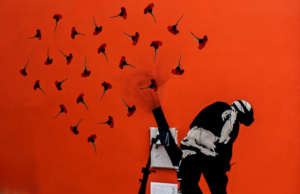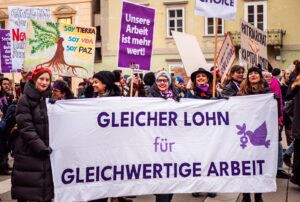In the regional elections which took place on April 23rd, 2023 in the Austrian state of Salzburg, the Communist Party of Austria (KPÖ) reached its best result in history in a federal state election.
In Austria, the elections in the federal state of Salzburg ended in a sensation. The list of Communist Party and Independents (KPÖ plus) achieved 11.66% (an increase of 11.35%), which is the best result the Communist Party has ever reached in federal state (and national) elections.
Equally sensational is the increase in votes in the capital of Salzburg itself: with 21.51% (an increase of 20.32%) and 12,700 votes KPÖ plus came in second only slightly behind the conservative People’s Party (ÖVP).
After 28.8% of voters in Graz had voted for the KPÖ and Elke Kahr became mayoress, the honest and authentic politics of a young team around 34-year-old Kay-Michael Dankl in the Salzburg city council has paved the road to this great success.
It does not seem completely impossible that Dankl, who became a city councillor only in 2019, will succeed again and will, like Eke Kahr, become the mayor of a federal state capital.
A Positive Signal for the Entire Country?
In the last national elections in 2019 KPÖ only reached less or slightly more than 1% of the votes. Also in Styria, where KPÖ is stronger in regional and communal elections, the party remained below 2% of the votes in national elections. From this it can be concluded that voters clearly distinguish between the different kinds of elections and the state and national levels.
The strength of the KPÖ, until recently a regional phenomenon, could soon turn into a nation-wide one. In current “Sunday polls”, KPÖ scores 7% and thus would enter parliament for the first time since 1959, with the party clearly passing the 4-percent threshold.
After European parliamentary elections in spring, the next elections for the national council are due in autumn 2024 at the latest.
Party Political Landscape
The conservatives were able to keep the first place, but just like the Social Democrats and Greens they lost votes. The liberal party NEOS was even voted out of the state parliament.
The right-wing extremist Freedom Party (FPÖ) gained massively in Salzburg – like in all other recent state parliamentary elections. This increases the probability of a new federal government of conservatives and right-wing extremists after the national parliamentary elections next year. At almost 30%, FPÖ comes first in opinion polls on national parliamentary elections and ÖVP has almost levelled out most political differences with FPÖ.
Here also the crisis in which Austrian Social Democracy finds itself is worth mentioning. For months now the party has been entangled in a debate about its leadership thus paralysing itself. On the other hand, the entrance in 2019 of the Greens into government with the conservatives led to the Green party shifting to the right with left political demands completely marginalised.
Voters and Media
386,972 inhabitants of the state of Salzburg were entitled to vote. Nearly 71% made use of their right, which is an increase of 6% compared to the last elections.
If the voters of KPÖ voted at all five years ago, they voted for either Social Democrats or Greens. Addressing the non-voters was one of the declared aims of the election campaign of KPÖ plus. Voters of KPÖ are mostly pessimistic with regard to the present and the future and feel themselves not represented by current politics, in this respect ranging immediately after the voters for FPÖ.
While right-wing and liberal parties as well as some Social Democrats are not able to make sense of this electoral sensation and react with their usual anti-Communist statements, street surveys show that people simply cannot afford their everyday lives any more while those politically responsible fail to take action. That KPÖ was elected for their social politics and this in spite of – and not because of – the ‘communism’ in their name, seems almost certain, though.
It also looks as if the conservative press had ‘supported’ KPÖ by mentioning the party’s demands and, not last, to show to Social Democracy their limits. Despite the traditional anti-Communism prevailing in Austria no medium was able to ignore KPÖ, which soon came to score 6% in opinion polls, with the threshold for entrance into the Salzburg federal state council being 5%.
Subject-oriented and committed politicians as well as breaking through the wall of silence and rendering invalid the argument of the lost vote, with the overstepping of the electoral threshold becoming more probable, seem to be the most important ingredients for the recipe of KPÖ’s success.
Topics and Political Approach of KPÖ plus
The topic of housing was THE topic in the election campaign with KPÖ plus credibly representing alternatives to the existing “housing emergency”. With demands for affordable housing and for wages one can live off, enough money for heating and food as well as health care and education particularly burning issues in times of inflation were addressed.
Moreover, the old approach by KPÖ of “bringing to the council’s notice what happens outside and bringing back to the public what happens inside” seems to have hit a nerve, accompanied by Dankl’s announcement of aspiring to be the ‘pain in the neck’ of the state governor.
In Salzburg, KPÖ plus has introduced the model of the social fund for people in need, with Kay-Michael Dankl following the model of Graz and paying part of the salary from his political offices to this fund.
When asked about the fraction of KPÖ plus which is now part of the federal state council without prior experience to resort to, Dankl answered that all 42 candidates on the list are “experts for their daily lives”. Also, the four newly elected members of the federal state council will keep from their salary only what an average skilled worker earns and pay the rest into the social fund.
KPÖ plus had a budget of 80,000 Euro at their disposal and brought “much heart and soul” to their election campaign, which rested on the shoulders of many “volunteers”. In comparison, ÖVP had a budget of one million at their hands, also due to the high amount of party funding and payment of electoral expenses criticised by KPÖ plus.
Elections are not comparable to a “football match” which you just win and that is that; work really starts afterwards, Dankl says. As prophesised by KPÖ plus in the election campaign, all other parties represented in the federal state parliament offered themselves to ÖVP as a potential coalition partner immediately after the elections, but the “coalition partner of KPÖ plus is the people”. This means, continuing and expanding the open-door policy with an increased number of office hours and door step visits. After five years it will be seen which progress we will have made and which success we will have achieved, Dankl says.
Finally, Dankl’s political style can be described as confident, relaxed and authentic, his communicative skills revealed in interviews are remarkable and outshine those of the one or other experienced politician of other parties.



